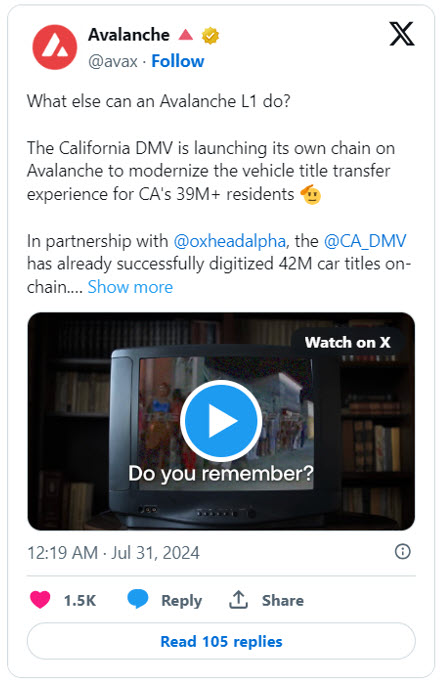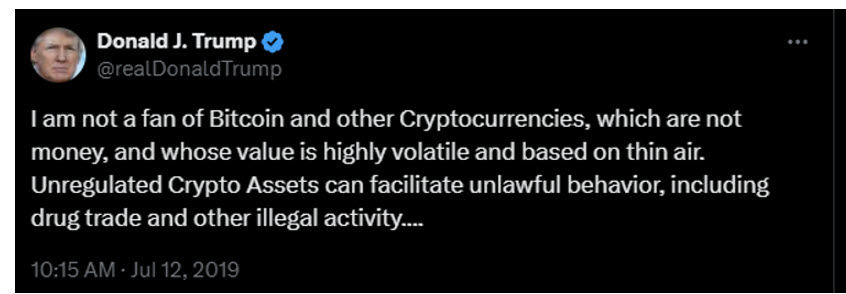- within Consumer Protection topic(s)
- with Senior Company Executives, HR and Inhouse Counsel
- with readers working within the Transport industries
Michael Bacina, Steven Pettigrove, Jake Huang, Luke Higgins and Luke Misthos of the Piper Alderman Blockchain Group bring you the latest legal, regulatory and project updates in Blockchain and Digital Law.
Mint My Ride: California DMV goes digital with blockchain titles
The California Department of Motor Vehicles (DMV) has successfully digitised 42 million car titles using blockchain technology. This initiative, in collaboration with tech company Oxhead Alpha and utilizing the Avalanche blockchain, is the first of its kind in the United States, allowing residents to access their vehicle titles through a mobile app. The initiative was first announced in January of last year.

This digital transition aims to simplify the title transfer process, traditionally requiring in-person visits to DMV offices. By moving to a digital format, the DMV hopes to reduce administrative burdens and provide a more convenient experience for car owners. John Wu, president of Ava Labs (of Avalanche), explained the process to Reuters:
The State of California DMV has already created the 42 million titles as tokens on the Avalanche blockchain. The next step is developing a digital wallet that residents can download to their phones
In addition to improving efficiency, the use of blockchain technology offers enhanced security against lien fraud. The immutable nature of blockchain records helps create a transparent history of ownership, making it more challenging for fraudulent activities to occur undetected.
As technology evolves and digitisation becomes more prevalent, it is likely that other government agencies will explore similar applications of blockchain technology. This initiative also highlights blockchain's broader potential beyond cryptocurrencies, with such a project demonstrating the versatility of blockchain in public sector applications.
Reading the tea leaves: SEC to amend Binance complaint
The United States (US) Securities and Exchange Commission (SEC) has foreshadowed its intention to amend its complaint against Binance, signalling a significant shift in the ongoing legal battle. The move could impact allegations that certain third-party tokens traded on Binance's platform were securities, which has been a focal point in the case.
Earlier this month, during a court hearing, questions were raised about the potential implications of a ruling on specific tokens. The SEC's decision to amend its complaint appears to be a strategic response to these discussions, as detailed in a court filing.
It has been over a year since the SEC filed charges against Binance and two months ago former Binance CEO, Changpeng Zhao (CZ), was sentenced on money laundering charges. Binance had sought to dismiss the SEC claim, which was partially successful and resulted in a rejection of the SEC's broad assertion that crypto tokens themselves are inherently investment contracts subject to SEC oversight.
The SEC has informed Binance about its plan to seek permission to amend the complaint. This amendment could potentially sidestep the need for the court to rule on the allegations related to third-party tokens at this stage.
The third-party tokens listed in the Binance complaint include SOL, ADA, MATIC, FIL, ATOM, SAND, MANA, ALGO, AXS, and COTI. These digital assets, issued by companies other than Binance, have been alleged by the SEC to be unregistered securities. However, the developers and issuers of those tokens are not party to the Binance complaint creating potential uncertainty over the precedent value of any judgment handed down and the listing of these tokens by other exchanges.
The legal saga underscores the complex regulatory landscape facing the crypto industry, and highlights the imperfect nature of the Court process in trying to provide legal clarity to crypto market participants. It is unclear whether the SEC's mooted amendment signals a broader shift in its litigation strategy or approach to regulation of digital assets. For now, it's a case of reading the tea leaves while the SEC prepares a fresh pot for Binance.
Federal Court weighs into "Is crypto property?" debate
In a recent decision regarding a freezing order sought by the Australian Securities and Investment Commission (ASIC), the Federal Court of Australia has endorsed the view that cryptocurrency is capable of being "property" for the purposes of granting an interlocutory injunction.
The decision concerns ASIC's proceedings against NGS Pty Ltd (NGS) and its affiliates over an allegedly unlicensed investment scheme. In April 2024, ASIC urgently sought ex parte orders to appoint receivers and to preserve cryptocurrency assets held by the defendants. Meagher J of the Federal Court supported the application and granted interim receiver and asset preservation orders.
However, on 27 May 2024, two of the defendants filed an application to set aside or vary the orders, which were the focus of this application. One of the grounds on which they applied to set aside the order is that cryptocurrency is not property. They claimed,
Cryptocurrency is not property within the meaning of that term in s 9 of the Corps Act. Therefore the defined term, "Digital Currency" in the Freezing Orders is flawed. Further, no Australian authority supports that cryptocurrency is property (see Web3), yet each defined term in the Freezing Orders assumes so. The Court was not informed of those two fundamental matters.
And that
There was no exploration by ASIC of whether cryptocurrencies constituted property under Australian law for the purposes of the Corporations Act.
In response, ASIC said in its submission that:
ASIC's case does not rely on cyber currencies being 'property' under the Corporations Act. In any event, cryptocurrency has been held to be property by the English Court of Appeal and in other jurisdictions, and ASIC has previously obtained similar orders for the appointment of receivers over digital currency assets.
Collier J of the Federal Court rejected the defendant's application and sided with ASIC. In considering whether cryptocurrencies constitute property, he said
I am satisfied that, at an interlocutory level, the definitions of financial service, financial product, financial investment and property in the Corporations Act are sufficiently broad to encompass cryptocurrency assets in appropriate circumstances, and the orders made by her Honour (as subsequently varied).
Collier J also draw support from Jackman's recent speech on the topic entitled "Is cryptocurrency property" delivered on 21 June 2024 to the Commercial Law Association. In this speech, Jackman J gave the following reasons:
- cryptocurrency was in effect assumed to be property in the two cases which might have analysed the issue (Commissioner of the Australian Federal Police v Bigatton [2020] NSWSC 245 (Cavanagh J); Chen v Blockchain Global Limited (2022) 66 VR 30 (Attiwill J)) and
- the analysis of Gendall J in the High Court of New Zealand in Ruscoe v Cryptopia Limited (in liq) [2020] 2 NZLR 809, where the Court held that the cryptocurrencies in question were a species of intangible personal property which were without question capable of being the subject matter of a trust, and not simply a form of information.
The issue of whether cryptocurrency is a type of property (and if so, which type) has repeatedly been argued by litigating parties and discussed in courts in different common law jurisdictions. So far cases in Australia, including this one, are mainly of interlocutory nature, while courts and law markers in other common law jurisdictions (such as the UK) have been more progressive in paving the way for cryptocurrency to be recognised as a type of personal property.
The characterisation of cryptocurrency as personal property is an important threshold issue for legal recognition under statute and in civil proceedings. While Collier J's decision is another step toward dispensing with this issue in Australia, we will have to wait a little longer for a conclusive ruling on this important question.
The best, the most beautiful bitcoin stockpile – coming soon?
Former President and Republican Nominee for the 2024 US Presidential Election, Trump, has used a speech at Bitcoin Nashville to promote his policy of creating a US national Bitcoin strategic stockpile.
A strategic stockpile or reserve is used by a government to collect certain commodities to have available when needed, or if there is a potential for supply disruptions. Famous strategic reserves include an emergency crude oil reserve in the US and a Maple syrup reserve in Canada.
Trump made clear his approach to crypto is focused domestically:
The reason I've come to address the Bitcoin community today can be summed up in two very simple words: America first...
[Bitcoin is] going to the moon, I want America to be the nation that leads the way.
In his 'appeal to crypto voters' Trump said, if elected:
will immediately appoint a Bitcoin and crypto Presidential Advisory Council... Their task will be to design transparent regulatory guidance for the benefit of the entire industry, and they will get it done in 100 days.
We will have regulations, but from now on the rules will be written by people who love your industry, not hate your industry
Further he would reform the Securities and Exchange Commission by dismissing the current chair:
On day one, I will fire Gary Gensler [AUDIENCE CHEERS "TRUMP! TRUMP! TRUMP!"] I didn't know he was that unpopular. Let me say it again: on day one, I will fire Gary Gensler. ... I will appoint a new SEC chairman who believes America should build the future, not block the future. ...
And finally, he announced a strategic stockpile:
if I am elected, it will be the policy of my administration, [the government of the] United States of America, to keep 100% of all the bitcoin the U.S. government currently holds or acquires into the future, we'll keep 100%. I hope you do well, please. This will serve, in effect, as the core of the strategic national bitcoin stockpile
President Trump finished by complimenting those present:
You are the modern-day Edisons and Wright brothers and Carnegies and Henry Fords, and what you do in your lifetime stands a chance to outlive us all and inspire humanity for generations to come
While President Trump has famously been skeptical in the past of crypto-assets he also famously changes his views on matters regularly:

The Australian reception to this news has been positive, with Maple Founder Sidney Powell praising the approach and CEO of SwyftX, Jason Titman saying the Trump promises were:
good for the American economy, for innovation, and hopefully that will boost activity in Australia
The Harris campaign is yet to reveal any pro crypto stance but the pressure from the Republicans may well force a more sensible approach in future, and hopefully end regulation by enforcement in the US (and potentially help in Australia as well).
The content of this article is intended to provide a general guide to the subject matter. Specialist advice should be sought about your specific circumstances.





